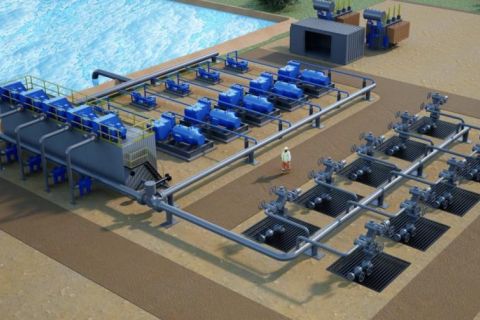With growing supplies of natural gas from unconventional sources in the U.S. and Canada, many producers are struggling to treat, process and move their gas to market. Although the need is not acute, there is a renewed and ongoing interest among midstream operators to buy or build gas treating and processing units. This renewed focus leads many midstream operators to form strategic partnerships near unconventional sources to handle the growing supplies of natural gas coming out of the ground.
Jack Lafield, president and chief executive of Dallas-based Caiman Energy LLC, said the gathering, treating and processing infrastructure in the Marcellus shale is still not capable of handling the expected increase in natural gas production from the region.
Speaking at Hart Energy's DUG East conference, he said the region clearly needed additional infrastructure.
"There are 50,000 miles of pipeline in Appalachia, but 90% of it is a 50-pound system that is not built to handle shale development. The real need in Appalachia is brand-new facilities. In the rich areas of the Marcellus, it's not just pipelines that you need. You need processing facilities, and the lack of ability to move natural gas liquids (NGLs) from the processing facilities requires the development of fractionators. Processing facilities need to be in place before drilling can really get started."

Kinder Morgan Treating’s skid-mounted, modular 150-gpm amine plant in Wise County, Texas, is treating carbon dioxide in 100 MMcf per day of natural gas.
In South Texas, operators are seeing a similar story. Midstream operators are investing heavily in take-away, transport, treating and processing capacity to cope with the rising output from the region.
Kinder Morgan Energy Partners LP recently purchased SouthTex Treaters, a designer and manufacturer of amine treatment plants, for $155 million. The amine treatment plants—which remove carbon dioxide (CO2) and hydrogen sulfide from natural gas streams—range in size from 5 to 1,200 gallons per minute. Kinder Morgan Treating, a subsidiary of Kinder Morgan Energy Partners, will use the acquisition to build amine plants and offer customers the option to own or lease the equipment.
Bill Stokes, vice president of business development for Kinder Morgan Treating, says the acquisition stems in part from the additional supplies of natural gas that need treating to meet pipeline quality specifications. Many of the emerging shale plays produce natural gas that has too much CO2 and hydrogen sulphide (H2S) for the pipelines that move them. They require basic treating before they enter the pipeline system.
"We are definitely seeing increased demand for gas treating plants as new supply is brought online. Many of the emerging shale plays contain gas that does not meet pipeline quality specifications for CO2 or H2S. Amine treating plants usually provide the most economic way to remove these impurities," he says.
The 84-acre manufacturing facility is in Odessa, Texas, makes typical and skid-mounted units that can be installed quickly. A100 gallons per minute amine plant, for example, can be installed in three or four weeks.
Virtually all shale gas has some CO2, although it is not necessarily more than the gas taken from conventional sources. Haynesville shale, for example, has between 5% to 6%, Barnett usually has between 2% and 4%. Avalon shale can be as high as 12% by volume. Pipeline specification for CO2 is 2%.
Today, Kinder Morgan owns the largest fleet of rental or contract amine plants, with more than 200 amine plants under operating leases to customers.
"We are seeing a lot of customers who would prefer to own these plants rather than lease them," Stokes says. "So having a facility that manufactures amine plants allows us to sell plants to those customers to those who want to own them." Also, Kinder Morgan can install the plants and operate them for a fee from producers.
"Our core business is leasing, operating and selling amine treating plants, but we are considering manufacturing cryogenic processing plants at the SouthTex facility. There is certainly a demand for processing right now," Stokes says.
Other facilities
In addition to its Odessa plant, Kinder Morgan has a facility in Victoria, Texas, that it uses to refurbish amine treatment plants. It also recently acquired a company which manufactures gas chill units, or mechanical refrigeration units. The plant in Tyler, Texas, makes small, skid-mounted units that can generally be installed within two days. Producers often use them at the wellhead to control the hydrocarbon dew point for their gas stream or to enhance the revenue stream for liquid recoveries.
"Many of our customers are installing these small units at the wellhead to recover liquids and enhance their revenue stream. We have more than 150 of our gas-chill mechanical refrigeration units currently in service," he says.
In response to the growing production from natural gas fields in South Texas, Kinder Morgan formed Eagle Ford Gathering LLC, a joint venture with Copano Energy LLC. Eagle Ford Gathering recently expanded its gathering and processing capacity for producers by more than 200 MMcf per day. Eagle Ford Gathering built 111 miles of 30-inch and 24-inch pipeline in the western Eagle Ford shale.
The company announced plans to construct 66 miles of additional pipelines to deliver gas to the Formosa Hydrocarbons Co. complex in Calhoun County, Texas, for processing. The additional pipelines will enable Eagle Ford Gathering to more fully utilize the 600 MMcf per day capacity of the Eagle Ford shale pipeline.
Eagle Ford Gathering signed a long-term agreement with Williams Partners LP to process Eagle Ford shale production at Williams Partners' Markham processing plant in Matagorda, Texas. Under terms of the agreement, Eagle Ford Gathering built a 6-mile 20-inch lateral to connect its 24-inch crossover pipeline project to the Markham plant and installed about 3,400 horsepower of compression. The agreement initially provides Eagle Ford Gathering with 100 MMcf per day of processing capacity at the Markham plant, with an option to increase capacity by another 50 MMcf per day.
In addition to anchor tenants SM Energy Co. and Chesapeake Energy Co., Eagle Ford Gathering executed long-term agreements to transport, process and fractionate natural gas produced by Anadarko E&P Co. LP, Petrohawk Energy Corp. and Rosetta Resources Inc., three other leading operators in the Eagle Ford shale.
Additional plays
The industry has announced a series of new and expanded gas processing and treating units in multiple plays throughout the U.S.
Atlas Energy entered into a long-term agreement with XTO Energy Inc. to provide natural gas gathering and processing services for up to 60 MMcf per day from the Woodford shale region of Oklahoma at its Velma, Oklahoma, processing facility. Under the agreement, Atlas will provide gathering and processing services for XTO production in the liquids-rich area within the Woodford shale.
The agreement supports Atlas' previously announced expansion of its Velma system. In May 2011, Atlas announced it would expand the facility by 60 MMcf per day. A new cryogenic facility will come into service at the facility in the middle of 2012. With the new unit in place, the processing capacity of the plant will increase to 160 MMcf per day.
Eugene N. Dubay, chief executive of Atlas, says natural gas production from the area increased over the previous year and it needed the additional capacity to meet the needs of its producing customers.
Regency Energy Partners LP will begin building a natural gas processing plant in Ward County, Texas, to process natural gas from Bone Spring and Avalon shale formations, both of which are liquids-rich gas plays. The new facility will be built through a joint venture with Anadarko Pecos Midstream LLC and an affiliate of Chesapeake Energy Corp. The three joint venture partners will contribute one third of the $100 million needed to build the plant.
The project will include the construction of two plants, a 25-MMcf per day refrigeration plant and a 100 MMcf per day cryogenic processing plant. The initial start-up of the refrigeration unit is expected to be in service by the second quarter of 2012, with full facilities available by fourth-quarter 2012.
Targa Resource Partners LP ordered a new 200 MMcf per day cryogenic processing plant for its North Texas System to meet increasing production from the Barnett shale. The new processing plant, which will be built in Wise County, Texas, is expected to be operational in mid-2013 and will require about $150 million in capital expenditures.
In addition, Targa announced a 100,000 barrels per day expansion of its majority-owned Cedar Bayou Fractionator at Mont Belvieu, Texas, with construction expected to be complete in first-quarter 2013. The CBF Train 4 is expected to cost about $360 million. Its expansion is substantially contracted with long-term use-or-pay firm-capacity fractionation agreements.
American Midstream Partners LP purchased 50% interest in the Burns Point Gas Plant from Marathon Oil Co., for $35.5 million in cash. Burns Point is a cryogenic processing plant in St. Mary Parish, Louisiana. Enterprise Gas Processing LLC, an affiliate of Enterprise Products Partners, is the operator of the plant and owns the other half. The plant processes raw gas sourced offshore.
Enterprise Products Partners LP announced the construction of several new projects to process the growing production from the Eagle Ford shale. It will build an additional 300 MMcf per day cryogenic gas processing facility in Lavaca County, Texas. In addition, it will construct 62 miles of 24-inch diameter and 30-inch pipeline for increasing horsepower compression to transport the additional Eagle Ford shale gas.
The Yoakum natural gas processing facility currently has 600 MMcf per day under construction, which is expected to begin service during second-quarter 2012. With the additional 300 MMcf per day train, the plant will have a total capacity of 900 MMcf per day when service begins in first-quarter 2013.
Enterprise's fifth NGL fractionator in Mont Belvieu, Texas, began operation and is operating in excess of its nameplate capacity of 75,000 barrels per day. Meanwhile, the company has started the construction of a sixth NGL fractionator with a capacity of 75,000 barrels per day.
Spectra Energy Corp. announced it signed a multi-year agreement with Progress Energy Resources Corp. to provide natural gas gathering and processing services in northeastern British Columbia. The agreements apply to about 370 MMcf per day from the Montney shale.
Energy Transfer Partners announced it signed a long-term, fee-based agreement with XTO Energy to provide natural gas gathering, processing and transportation services to both Woodford and Barnett shale production. Energy Transfer will construct a 117-mile natural gas gathering pipeline from the Woodford shale in Oklahoma to its gathering and processing infrastructure in the Barnett shale. In addition, it will construct a new 200 MMcf per day cryogenic plant at its existing Godley processing facility in Johnson County, Texas. The new unit will boost the plant's processing capacity to 700 MMcf per day when it enters service in third-quarter 2013. The cost of the new gathering pipeline and processing plant is about $360 million.
SemGroup Corp. commissioned Exterran Holdings Inc. to build a new natural gas plant to handle production out of Mississippi. The new cryogenic plant is expected to process up to 60 MMcf per day. Its exact location, timeframe and cost were not announced.
Recommended Reading
Targa to Proceed with Permian Basin Apex Pipeline After All
2024-05-02 - Targa Resources expects to take a final investment decision for the Apex pipeline out of the Permian Basin before the end of the year.
Sage Geosystems Advances Commercial-scale Energy Storage Facility
2024-05-02 - The 3-megawatt facility in Texas is expected to become the world’s first commercial geopressured geothermal system when it’s commissioned in December.
Analyst Questions Kimmeridge’s Character, Ben Dell Responds
2024-05-02 - The analyst said that “they don’t seem to be particularly good actors.” Ben Dell, Kimmeridge Energy Partners managing partner, told Hart Energy that “our reputation is unparalleled.”
Marketed: Delta Minerals Non-producing Sale in Colorado
2024-05-02 - Delta Minerals LLC has retained EnergyNet for the sale of non-producing minerals in Bent, Cheyenne and Kiowa counties, Colorado.
Phillips 66 Weighs Divestments, Targets Renewable Fuel Increase
2024-05-02 - Phillips 66 looks to boost renewable fuels production by 67% through the end of the second quarter 2024 at its Rodeo complex in San Francisco while weighing a potential divestiture of its retail marketing businesses in Austria and Germany.




